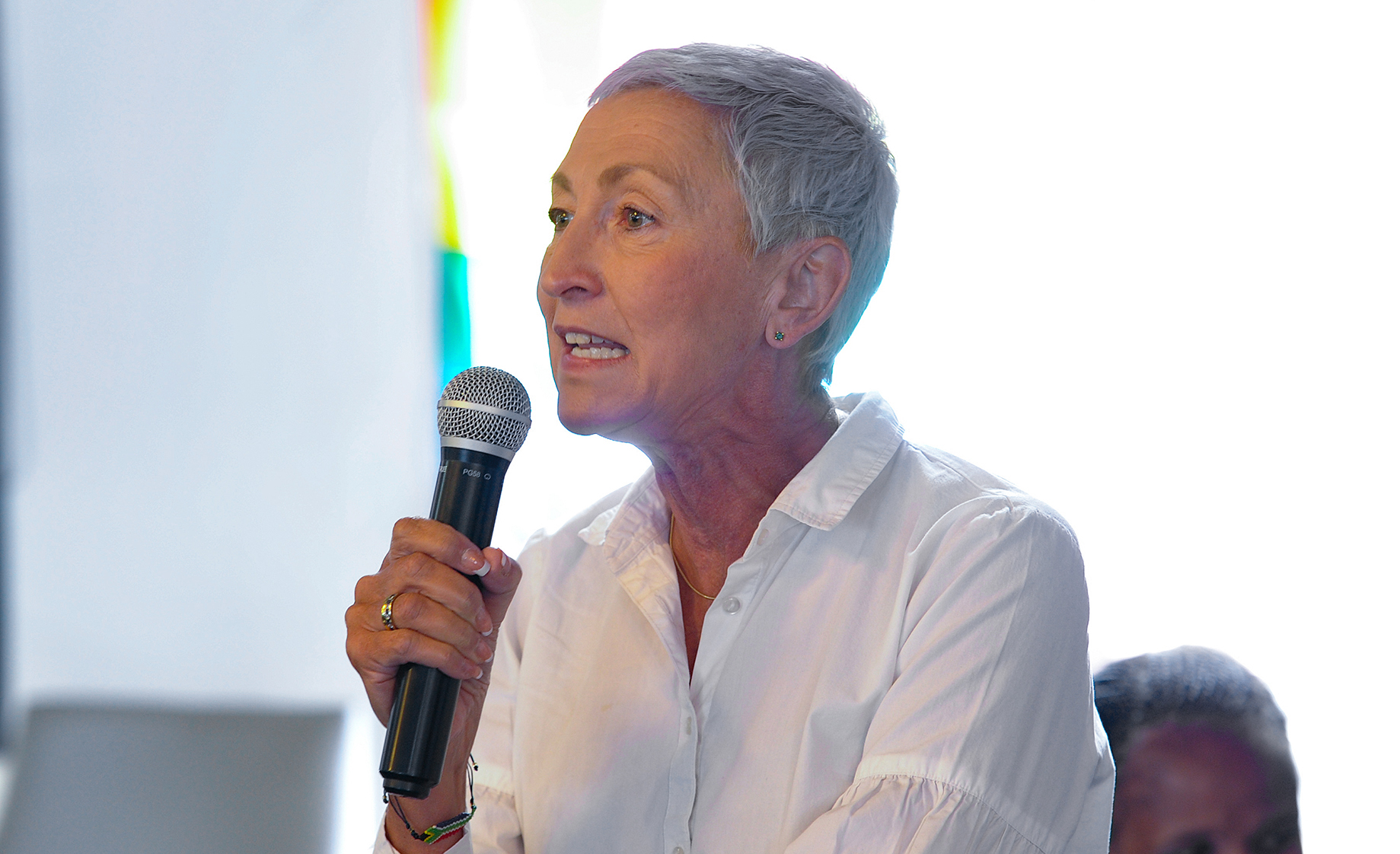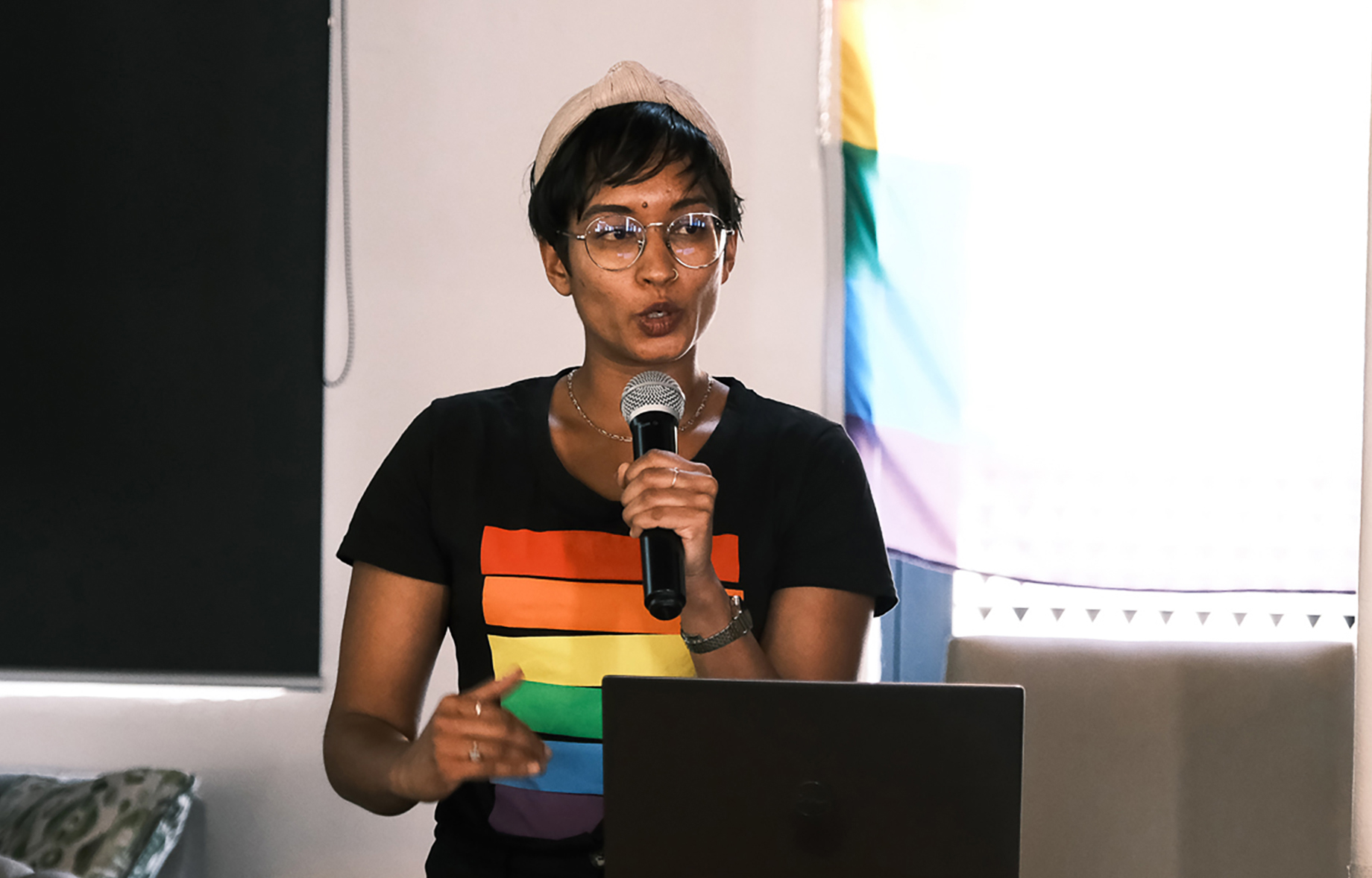LGBTQI+ HEALTH & ADVOCACY
Accessing holistic gender-affirming healthcare is a need and a human right

‘Humanity is wonderfully and miraculously diverse and every single person has the right to the best healthcare and services out there’ – Professor Linda-Gail Bekker, Desmond Tutu Health Foundation.
Lesbian, Gay, Bisexual, Transgender, Queer/Questioning and Intersex (LGBTQI+) populations are often marginalised and discriminated against in South Africa, with limited access to sensitive and affirming health services. On 26 November 2022, an LGBTQI+ Health and Advocacy Day was held in Cape Town. It brought together 135 LGBTQI+ health service providers, researchers, civil society and community members to share information about health services, research and advocacy for the LGBTQI+ community.
Currently in South Africa there is limited access to inclusive and sensitive LGBTQI+ health services. At best, health service providers realise that LGBTQI+ populations exist, but it is typically assumed that individuals using the health system are heterosexual and cisgender, and some services are plainly antagonistic towards LGBTQI+ individuals.
In a 2019 survey of LGBTQI+ populations in South Africa, it was found that 54% of respondents had been treated with disrespect in a health facility because of their sexual orientation and gender identity (SOGI), 31% had been called names or insulted, while 22% had been denied healthcare.
Only a handful of organisations in South Africa provide LGBTQI+ affirming health services. These include the Health4Men public sector clinics in Cape Town and Johannesburg, and the Yellow Dot Doctors in the private sector who are sensitised to the health needs of men who have sex with men (MSM). Two clinics in Cape Town – the Wits RHI Trans Health Centre and the Groote Schuur Hospital Transgender Clinic – offer services specific for transgender needs including gender-affirming hormone therapy, while the Gender Identity Development Service at Red Cross Children’s Hospital offers support services to gender-diverse young people. However, these services are in high demand, with limited access, and are severely underfunded and underresourced.

‘Humanity is wonderfully and miraculously diverse and every single person has the right to the best healthcare and services out there,’ said Professor Linda-Gail Bekker, who opened the LGBTQI+ Health and Advocacy Day 2022. (Photo: Simon Attwell)
The scarcity of LGBTQI+ friendly health services is compounded by the fact that the broader structures of our health system do not recognise or address structural and institutional homophobia and transphobia. There is a lack of sensitised healthcare workers who often assume their patients are heterosexual and cisgender, or actively discriminate against LGBTQI+ populations. There is a lack of training on the diversity of SOGI in the current medical curriculum, with little attention given to LGBTQI+ specific health needs, particularly transgender services such as gender-affirming hormone therapy.
Furthermore, healthcare environments are often unwelcoming to LGBTQI+ populations. The assumption of heterosexuality and cisgender identity is apparent in intake forms that do not reflect diverse gender identities and sexual orientations. Hospital wards are often gender-binary and assigned based on sex at birth which can be triggering for transgender people.
These barriers to accessing healthcare for LGBTQI+ populations are further exacerbated by other systems of oppression prevalent in South Africa. Inequalities in access due to race, economic status, education, geographic location and immigration status intersect with unequal access to care due to sexual orientation or gender identity. The Health and Advocacy Day aimed to address LGBTQI+ health needs and barriers to care with presentations from a diverse variety of speakers.
Transgender health services
“Accessing holistic gender-affirming healthcare is a need, much like accessing antiretrovirals or primary healthcare.” – Mx Greyson Thela
Worldwide, there has been a massive increase of clinic referrals for transgender men and women, with recognition of this at younger ages. Evidence-based guidelines have been developed by the World Professional Association of Transgender Health (WPATH) and are now in use all over the world. In South Africa, the Southern African HIV Clinicians Society has published gender-affirming guidelines aiming to facilitate access to healthcare for transgender people that is sensitive, skilled and respectful.
Gender-affirming services in the public sector are exclusive to three clinics in Cape Town, with high demand and limited access. The waiting list for gender-affirming surgery in the public sector is more than 20 years while in the private sector, medical aids regard gender-affirming hormone therapy and surgery as cosmetic. Gender dysphoria has been proven to result in poor mental health with high suicide rates for transgender men and women who do not have access to gender-affirming therapy.
“Research outcomes now mean that it is unethical to not offer evidence-based interventions for young transgender people” – Dr Simon Pickstone-Taylor, Gender Identity Development Service, Red Cross Children’s Hospital
Gender-diverse youth are a significantly at-risk population and are increasingly presenting to clinics where they require specialised care. Young transgender people often require gender-affirming treatment, including both reversible and irreversible hormone therapy, as well as psychosocial support to socially transition at home and at school.
Read in Daily Maverick: “Global discrimination against vulnerable groups fuels new HIV infections”
Schools in particular can be a difficult place to transition where flexibility is required with regards to school uniforms, sports, name changes, use of pronouns and access to gender-neutral toilets. Currently, there is much controversy about the Department of Basic Education’s new Guidelines for the socio-educational inclusion of diverse Sexual Orientation, Gender Identity, Expression and Sex Characteristics (SOGIESC) in schools, which aims to provide an inclusive environment for LGBTQI+ school pupils. The implementation of these guidelines is in no way a danger to heterosexual and cisgender pupils but could ensure that learning environments are safe and welcoming to those with diverse sexual orientations and gender identities and thus help end centuries of bullying and discrimination at schools.
Mental health
“Every child and adolescent deserves to experience joy, have high self-esteem, have friends, acquire confidence in their ability, and believe that they can succeed in life.” – Mx Viwe Tafeni, Triangle Project
Depression, anxiety, suicidality and substance use are higher among LGBTQI+ populations of all ages compared with the general population in South Africa. Younger members of the LGBTQI+ community are most at risk of mental health issues, with a higher suicide risk, not because of their SOGI but because of mistreatment and stigmatisation in society. Stigma and discrimination towards LGBTQI+ populations are common in South Africa.

‘The landscape of HIV prevention is ever changing, but we are surely getting closer to realising a generation free from HIV. With the advent of novel injectables, people who need PrEP will be empowered with choice,’ said Dr Yashna Singh of the Desmond Tutu Health Foundation. (Photo: Simon Attwell)
In a survey by Müller et al, LGBTQI+ participants reported high levels of physical, sexual and domestic violence because of their SOGI. Transgender and black participants experienced higher levels of violence than their cisgender or white counterparts.
Prevention and treatment of mental health issues need an inclusive approach for LGBTQI+ populations and must take place at both the individual and community level. At the individual level, there is a need for increased provision of appropriate LGBTQI+ friendly mental health services. Community education and awareness are required to decrease stigma and discrimination, especially violence, towards LGBTQI+ populations to create safe, inclusive environments. For society to flourish, all individuals, including members of the LGBTQI+ community, must have access to accepting and supportive mental health services as well as social support from their families and communities.
Health research
The paucity of research on LGBTQI+ populations and their health needs further perpetuates the lack of appropriate service provision. Data on SOGI are not routinely collected at local health facilities or at a national level.
“The landscape of HIV prevention is ever changing, but we are surely getting closer to realising a generation free from HIV. With the advent of novel injectables, people who need PrEP will be empowered with choice.” – Dr Yashna Singh, Desmond Tutu Health Foundation
While some data exist suggesting increased HIV risk among key populations in South Africa, including among MSM and transgender women, little work has been done on systematically rolling out and assessing the impact of preventative measures such as pre-exposure prophylaxis (PrEP) in South Africa. PrEP studies among MSM in New South Wales, Australia and Scotland have shown a decline in HIV incidence in the study populations as well as a reduction in the population-level incidence of HIV in MSM who were not on PrEP.
Visit Daily Maverick’s home page for more news, analysis and investigations
PrEP first became available in the form of a daily tablet, but groundbreaking research is being conducted on PrEP injection. The first injectable, cabotegravir given every two months, received regulatory approval in South Africa in November 2022. The roll-out and assessment of this novel intervention is essential particularly for key populations including MSM, transgender women and young cisgender women who are all at high risk of HIV in South Africa.
Read in Daily Maverick: “South Africa’s health regulator approves ‘innovative’ HIV-prevention injection”
While HIV prevention is one of the more obvious areas requiring research for the LGBTQI+ population, other important areas include the effect of gender-affirming therapy on mental health for young transgender people in South Africa, and both qualitative and quantitative assessments of the impact of therapeutic options for transgender care.
The way forward: Equitable access for LGBTQI+ populations
“Considering our long history of discrimination and exclusion, I think there is a minimum obligation for healthcare providers to indicate clearly to the LGBTQI+ population that their health environment is not antagonistic.” – Dr Richard Kaplan, Desmond Tutu Health Foundation
We have established that there are some serious failings in healthcare and service provision for LGBTQI+ populations. The Health and Advocacy Day was an opportunity to collectively outline a way forward. For comprehensive change to occur, consideration needs to be given to the lived reality of LGBTQI+ populations and the mental, physical and social factors that impact on their lives. Health services need to provide an appropriate package of care for LGBTQI+ populations based on the needs of the population. Guidelines and standards of care must be developed for all healthcare providers to incorporate LGBTQI+ specific health needs and services into practice of care. This must be both for treatment services as well as health promotion and prevention through primary healthcare.

‘Research outcomes now mean that it is unethical to not offer evidence-based interventions for young transgender people,’ Dr Simon Pickstone-Taylor, Gender Identity Development Service, Red Cross Children’s Hospital, said in a panel discussion on health services for gender diverse youth with Mx Greyson Thela and Mx Savuka Matyila, Gender Dynamix. (Photo: Simon Attwell)
All staff working in health facilities, and not only health professionals, should be trained on gender and sexual diversity, and LGBTQI+ affirming care. A good start would be the basic recognition of the various areas of SOGI diversity, from assigned sex at birth to variations in gender identity and expression and sexual orientation. To assist with this, the Desmond Tutu Health Foundation has created a free-access online resource, the SOGI universe, that provides an outline of SOGI terms and can be used as a tool to promote inclusion, increase knowledge and start dialogues around SOGI concepts.
Read in Daily Maverick: “KZN Health Department sets aside over R20m to equip and protect LGBTQI+ community”
Leaders at all levels of the health system need to be actively involved and reflect LGBTQI+ populations. LGBTQI+ inclusive strategies need to be clearly stated in policy and practice, and data must be collected at all levels of the health system. This information can be used to provide information on quality of care and disparities in access. Environments, whether health facilities, mental health or community services, need to welcome LGBTQI+ populations.
To decrease stigma and discrimination, community engagement can help to increase understanding through education. The inclusion of family and friends of the LGBTQI+ community in educational outreach activities has been shown to have positive impacts. In a US study, LGBTQI+ youth who live in a community that is accepting of LGBTQI+ people had lower rates of suicide attempts than those who do not.
The LGBTQI+ Health and Advocacy Day is an annual event to promote LGBTQI+ affirming health-care and was a great starting point to bring together and grow a network of LGBTQI+ health service providers, activists, civil society and community members. It highlighted the many gaps needed to comprehensively address LGBTQI+ health needs and provide sensitive, affirming health services that are accessible to all. It was an opportunity to identify how we can all advocate for LGBTQI+ health in our own lives, and ensure an increase in service provision for and acceptance of LGBTQI+ populations. DM/MC
Lynn Bust is the Project Manager of the LGBT+ Health Division at Desmond Tutu Health Foundation. She is a health systems and policy researcher by training and a proud member of the LGBTQI+ community.
Richard Kaplan is a Senior Researcher and Site Lead of the Desmond Tutu Health Foundation Clinical Trials Unit at Groote Schuur Hospital. He also heads the DTHF LGBT+ Health Division with a focus on HIV prevention trials for MSM and Transgender populations.
The 2022 LGBTQI+ Health and Advocacy Day was jointly organised by the Desmond Tutu Health Foundation, Inclusive and Affirming Ministries, People Against Suffering, Oppression and Poverty, the Triangle Project, Gender DynamiX, Trans Tec SA, and Your True Colours. The day was sponsored by the Desmond Tutu Heath Foundation and Gilead Sciences.





















 Become an Insider
Become an Insider
Comments - Please login in order to comment.